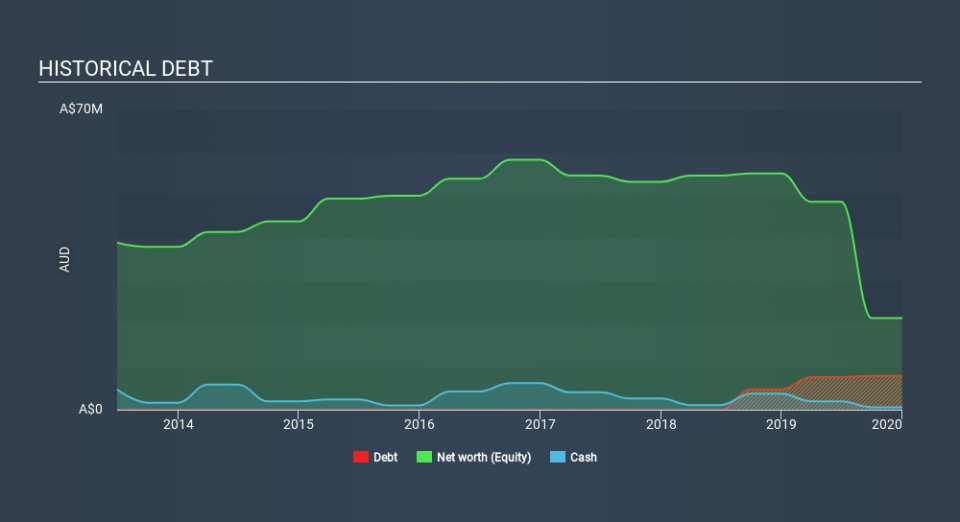Did Changing Sentiment Drive A-Cap Energy's (ASX:ACB) Share Price Down A Painful 81%?

This month, we saw the A-Cap Energy Limited (ASX:ACB) up an impressive 120%. But only the myopic could ignore the astounding decline over three years. Indeed, the share price is down a whopping 81% in the last three years. So we're relieved for long term holders to see a bit of uplift. But the more important question is whether the underlying business can justify a higher price still.
We really hope anyone holding through that price crash has a diversified portfolio. Even when you lose money, you don't have to lose the lesson.
View our latest analysis for A-Cap Energy
We don't think A-Cap Energy's revenue of AU$4,199 is enough to establish significant demand. This state of affairs suggests that venture capitalists won't provide funds on attractive terms. As a result, we think it's unlikely shareholders are paying much attention to current revenue, but rather speculating on growth in the years to come. It seems likely some shareholders believe that A-Cap Energy will discover or develop fossil fuel before too long.
As a general rule, if a company doesn't have much revenue, and it loses money, then it is a high risk investment. There is almost always a chance they will need to raise more capital, and their progress - and share price - will dictate how dilutive that is to current holders. While some such companies do very well over the long term, others become hyped up by promoters before eventually falling back down to earth, and going bankrupt (or being recapitalized). It certainly is a dangerous place to invest, as A-Cap Energy investors might realise.
A-Cap Energy had liabilities exceeding cash by AU$7.5m when it last reported in December 2019, according to our data. That puts it in the highest risk category, according to our analysis. But with the share price diving 43% per year, over 3 years , it's probably fair to say that some shareholders no longer believe the company will succeed. You can click on the image below to see (in greater detail) how A-Cap Energy's cash levels have changed over time.
It can be extremely risky to invest in a company that doesn't even have revenue. There's no way to know its value easily. Would it bother you if insiders were selling the stock? I would feel more nervous about the company if that were so. You can click here to see if there are insiders selling.
What about the Total Shareholder Return (TSR)?
Investors should note that there's a difference between A-Cap Energy's total shareholder return (TSR) and its share price change, which we've covered above. Arguably the TSR is a more complete return calculation because it accounts for the value of dividends (as if they were reinvested), along with the hypothetical value of any discounted capital that have been offered to shareholders. We note that A-Cap Energy's TSR, at -81% is higher than its share price return of -81%. When you consider it hasn't been paying a dividend, this data suggests shareholders have benefitted from a spin-off, or had the opportunity to acquire attractively priced shares in a discounted capital raising.
A Different Perspective
We regret to report that A-Cap Energy shareholders are down 74% for the year. Unfortunately, that's worse than the broader market decline of 16%. However, it could simply be that the share price has been impacted by broader market jitters. It might be worth keeping an eye on the fundamentals, in case there's a good opportunity. Regrettably, last year's performance caps off a bad run, with the shareholders facing a total loss of 21% per year over five years. Generally speaking long term share price weakness can be a bad sign, though contrarian investors might want to research the stock in hope of a turnaround. I find it very interesting to look at share price over the long term as a proxy for business performance. But to truly gain insight, we need to consider other information, too. Even so, be aware that A-Cap Energy is showing 6 warning signs in our investment analysis , and 4 of those shouldn't be ignored...
But note: A-Cap Energy may not be the best stock to buy. So take a peek at this free list of interesting companies with past earnings growth (and further growth forecast).
Please note, the market returns quoted in this article reflect the market weighted average returns of stocks that currently trade on AU exchanges.
If you spot an error that warrants correction, please contact the editor at editorial-team@simplywallst.com. This article by Simply Wall St is general in nature. It does not constitute a recommendation to buy or sell any stock, and does not take account of your objectives, or your financial situation. Simply Wall St has no position in the stocks mentioned.
We aim to bring you long-term focused research analysis driven by fundamental data. Note that our analysis may not factor in the latest price-sensitive company announcements or qualitative material. Thank you for reading.

 Yahoo Finance
Yahoo Finance 
